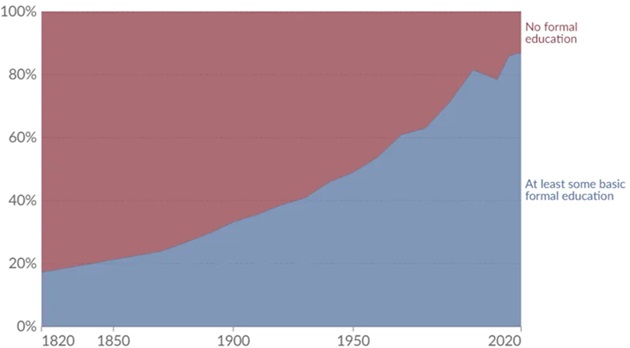
On Biden’s AI Executive Order
- Stephen McBride
- |
- November 6, 2023
- |
- Comments
This article appears courtesy of RiskHedge.
Happy Friday!
The S&P 500 is up 4% this week.
The perfect concoction of solid earnings, a strong economy, and falling rates are driving stocks higher. I remain bullish.
It’s easy to get distracted by short-term market gyrations. But remember, there are always fast-growing disruptive megatrends screaming higher no matter what markets do.
Artificial intelligence (AI) is by far the most important megatrend today.
Let’s talk about Biden’s new plan to make sure it’s “safe.”
- Is the US government trying to ban AI?
I loved video games as a kid. My grand-dad used to joke that I was raised on “TV and toast.”
Harmless fun, right? Well, the Japanese government once considered the PlayStation 2, in the wrong hands, a military weapon. Because the chips within it were too powerful. Look at this newspaper clipping from 2000:

Source: Pessimists Archive
President Biden’s new AI executive order reminds me of this folly.
I combed through the 100-page document so you don’t have do. The big takeaway is this. Firms building AI tools more powerful than the latest ChatGPT must now conduct safety tests and report the results to Uncle Sam.
This is a big mistake. It’s far too early to regulate this new wave of AI. It isn’t even one year old and is rapidly evolving.
Bureaucrats seem to think they can predict an unknowable future.
You couldn’t have predicted Google (GOOG), Facebook (META), or Uber (UBER) in the early ‘90s. So, how could you pass laws to regulate them? Same for AI today.
The internet created trillions of dollars in wealth and improved our lives because the government mostly left it alone. Thank goodness Silicon Valley is 3,000 miles away from Washington!
This AI executive order is silly. But it’s nothing new. Uncle Sam tried to ban internet browsers and Apple’s (AAPL) Mac PC in the ‘90s (seriously).
Here’s the important part.
Rather than slowing down AI progress… these new regulations will accelerate it.
That’s because they only have teeth against large companies building AI tools like OpenAI and Google. But that’s not where the most breathtaking progress is taking place.
Developers working on “open source,” freely available AI models are making the real breakthroughs. And they can easily skirt these new rules.
Think of Biden’s AI Executive Order like a chain link fence. It’ll slow down the big dogs of tech. But the swarms of smaller upstarts will fly right through.
I’ve long said AI is the great equalizer. Watch for small companies to quicky disrupt big tech in ways previously thought impossible.
- Forget ChatGPT… the AI “app” era is here.
There won’t be one AI to rule them all.
There will be millions of “AIs”... all doing different things.
In Amsterdam earlier this week, I chatted with guys who are building AI versions of themselves to serve millions of clients around the world.
That’s different from Waymo’s AI-powered robo-taxis.
Which are nothing like the AI tools bringing new drugs to market for a fraction of the cost.
We’re witnessing the birth of specialized AI “apps,” which could become part of everyday life for billions of people.
I’m excited about all the new winners there will be in AI. A handful of big tech companies dominated the last decade. But as you know, AI is the great equalizer.
It gives startups extreme leverage and allows them to go from 0 to 100 really quick.
ChatGPT launched less than a year ago. Its creator OpenAI is raking in $100 million/month from it. It used to take software companies YEARS to reach this scale.
One AI app I’m looking forward to is from Turbulence Solutions. It’s a new AI system that promises to make flights turbulence free.
The only thing all these AI apps have in common is they run on Nvidia (NVDA) chips.
Anyway, it’s a great time to be alive. Time to shake off the pessimism of the 2010s and dream big.
Here’s an image of “our bright future” I generated with OpenAI’s new DALL.E 3 image generator. Give it a try!

- My dentist was right.
I warned you to avoid Invisalign’s (ALGN) stock a few weeks back.
It plunged 22% in one day last week after reporting woeful earnings, ouch!
Align pioneered clear plastic braces for your teeth. Its stock handed early investors 4,000% profits.
But my dentist gave me the “heads up” that competitors are now making better braces at half the price Align charges. Sure enough, I recently got plastic braces. They’re great. They’re not Align brand.
Sometimes the best info comes from the strangest places!
Lesson: Every disruptor eventually gets disrupted. Many big tech stocks are next on the chopping block.
AI will be swinging the axe.
- Today’s dose of optimism…
We complain (me included) about our creaking education system.
But it’s easy to forget that just 200 years ago, less than one in five adults could read and write!
That ratio has now reversed, as this chart shows.

Source: Our World In Data
Human progress can feel fragile in shorter time frames.
But as a species, we’ve been going “up and to the right” for 200 years.
For 99.9% of history, most people were dirt poor. America… capitalism… technology and what you might call Western values have created an age of unparalleled prosperity.
Let’s double down on what makes us great.
Stephen McBride
Chief Analyst, RiskHedge
|

This article appears courtesy of RH Research LLC. RiskHedge publishes investment research and is independent of Mauldin Economics. Mauldin Economics may earn an affiliate commission from purchases you make at RiskHedge.com
